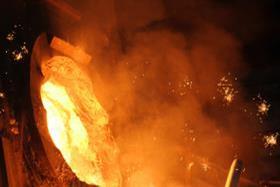Around 100 chemistry students from John Leggott Sixth Form College in Scunthorpe got to see redox chemistry on a giant scale during two visits to the local steelworks at Corus, Scunthorpe

Organised by the RSC's Southhumbria local section as part of Chemistry Week, the students toured the 2000 acre site in buses, disembarking along the way to learn about the steel-making process from preparation of the raw materials, through the Blast Furnaces, to the basic oxygen steel-making process and onto continuous casting of steel. Finally they watched Corus' premier steel product, 130 metre railway line, being rolled.
According to Corus chemist Helen Summerfield, chemistry is an important part of the steel-making process. 'Corus produces steels for a range of everyday essentials such as bridges, buildings, cars and ships. To ensure our products are fit for these purposes, our chemists test everything that goes into the steel and continually monitor the products as they go through the production process'.
The students had the opportunity to see analytical chemists at work in the central laboratories. Here classical wet analysis is used to test some of the 30 million gallons of water used daily in the steel-making process, and the most up-to-date spectroscopic equipment is used for metal analysis.






No comments yet